The Federal Capital Territory (FCT) is the administrative and political hub of Nigeria, housing the country’s seat of power – Abuja. The city is highly regarded as a masterpiece of urban planning and architecture, attracting thousands of tourists yearly. However, beneath the towering skyscrapers and lush greenery that adorn Abuja lies a host of issues that require urgent attention. In this report, Jumoke Olasunkanmi highlights five critical areas that must be tackled to provide a better living experience for residents and visitors alike.
Since 1999, a procession of presidents has graced the city’s corridors, each arrival and departure unveiling change within the FCT. Its rather slow growth, particularly in the satellite and suburban fringes, has provoked scrutiny, due to a myriad of underlying factors.
In an era where the ruling All Progressives Congress (APC) seeks to consolidate power, which in itself has been questioned by failure to secure victory in the FCT during the past three presidential elections, the impending incumbent assumes a role of paramount significance. The onus rests on the new minister, former Rivers State Governor, Nyesom Wike, to embrace a visionary posture to confront and unravel the conundrums plaguing this urban expanse.
These challenges encompass a multifaceted spectrum including:
Infrastructural deficit:
Amidst the sprawling expanse of Abuja’s urban canvas, glaring infrastructural insufficiency casts a looming shadow, capturing the collective concern of residents and observers alike. This is underscored by sad tales of road mishaps that have wreaked havoc upon the city.
According to a Federal Road Safety Corps (FRSC) report, there were 987 Road traffic crashes, 159 deaths and 1,872 injuries between January to September 2021 in the FCT. FRSC’s FCT sector commander, Oga Ochi, attributed a majority of these accidents to human factors of overspeeding and overloading, but the impacts of environmental factors like bad, unmotorable roads cannot be overemphasised.
The resounding impact of these derelict roads, their potholed surfaces, and crumbled foundations reverberate across the fringes of the city centre. The city’s highbrow areas are stark contrasts to the shadowy low-income neighborhoods scattered across the FCT. The likes of Dawaki, Lugbe, Nyanya, Apo, Bwari, Kubwa and Dei-Dei tell a tale of abandonment.
These densely populated communities exist in a state of paradox; caught within the web of their own vibrancy, yet shackled by the apathy they encounter. The tale they tell is one of roads in disarray, left to crumble and decay as they bear the weight of the countless lives that traverse them daily.
“Once you leave the main express to enter these community roads, transportation becomes nothing to write home about,” Adeniji Kashim, a resident of Dei Dei told the African Health Report (AHR). Especially during the rainy season, the road is not motorable and access to even our houses is difficult,” he added.

Ahmed Oluwasanjo, who lives in Mararaba, a community in Nasarawa State bordering the FCT where a lot of people commute to work from daily, had the same concern with the community-constructed and monitored roads.
The community roads themselves ought to serve as temporal palliatives done by community development associations pending critical intervention by the government. But as evidenced by the neglect, these satellite towns have waited for help from the government that never came.
“Once you leave the road done by the government into the streets, the linkers are so bad. They are community-provided roads,” Mr Oluwasanjo said. “In some areas, I learned people cannot drive their cars home. They park outside and trek in. That’s in Masaka,” he added, giving credence to earlier assertions by Mr. Kashim.
The deplorable state of these roads not only contribute to road accidents, it has also become an avenue for robbers and kidnappers to carry out their unscrupulous business.
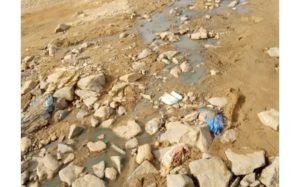
The street lightning project:
Significant efforts have been put forth, both in the past and recently, to address street lighting along the vast network of roads within Abuja. Yet, it is undeniable that the illumination of these roads remains an aspect of the cityscape that demands the unwavering attention of the incoming minister. The shadows cast by persisting inadequacies call for urgent attention.
Prominent expressways, including the Nnamdi Azikwe Express Road — a lifeline linking the airport and weaving through highly populated areas such as Lugbe, Yaskawa, Udo and Gosa, en route to the city’s heart — are marred by recurrent power outages. These instances of darkness are particularly pronounced on inclement rainy nights when the luminance of streetlights becomes a pivotal safety factor. The void left by absent or malfunctioning lights casts an ominous pall over these routes, raising concerns among both commuters and residents.
The dark sections of the Kubwa Express Road present a parallel tale of obscurity. In the cover of night, portions of this arterial pathway are cloaked in darkness, increasing the risk of accidents. Moreover, the lack of proper illumination creates fertile ground for clandestine activities to take root, furthering the risks that this lack of visibility poses.
As the new minister assumes his role, he is entrusted not only with the responsibility of illuminating the physical streets but also the metaphorical path toward a safer and more secure urban environment. The glaring gaps in street lighting infrastructure demand immediate attention and a committed effort to restore Abuja’s thoroughfares to their rightful status as beacons of safety and connectivity.
Improper waste disposal:
Abuja generates tonnes of waste daily, and the existing waste management infrastructure is inadequate to handle the volume. Several areas of the capital city of Abuja, once characterised by its allure and orderliness, now bear witness to a distressing tableau of eyesores, repugnant stenches, and the insidious threat of diseases lurking in the shadows of poor hygiene. The indiscriminate dumping of refuse has caused degradation across the sub-urban canvas, as heaps of waste become both symbols of neglect and incubators of affliction.
The Abuja Environmental Protection Board (AEPB) is charged with managing waste disposal, a custodian of cleanliness charged with overseeing the Federal Capital Territory’s (FCT) sanitation. Yet, this agency’s purview is limited to the capital city, leaving the six area councils within the FCT to grapple with waste management responsibilities within their domains.
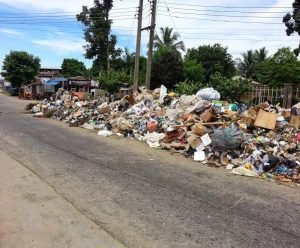
Illegal garbage dumps have now sprung forth like unwelcome growths by the roadsides in Kuje, and in Kubwa, where Adiza Hassan told the AHR that they continue to rely on cart pushers to dispose of waste.
“By now, we ought to have a routine to dispose of waste but the truck does not come around. We often pay cart pushers to get rid of the waste,” she said. Not many people go this route, and as evidenced by the pile of waste along the popular Arab road, more people consider the indiscriminate dump as an alternative.
All manner of solid waste finds its final resting place in illicit repositories such as this one, extending their fingers of filth into the air, water, and soil. The ramifications of this unhindered disposal extend beyond mere aesthetic degradation, penetrating deep into the ecosystem and even culminating in the eruption of disease outbreaks within the territory. Minister Wike must focus on investing in sustainable waste management practices such as recycling and composting, while also improving waste collection and disposal infrastructure.
Open defecation:
The persistent spectre of open defecation continues to cast its shadow, stubbornly defying the 2025 national deadline aimed at its eradication. Even within the confines of the FCT, where urban development and modernity converge, this practice remains distressingly prevalent, particularly in the sprawling suburbs.
Observations by the AHR reveal a complex class of factors that contribute to this regressive behaviour. The absence of accessible public toilets, despite significant efforts, creates a void, leaving individuals to resort to open spaces. Ignorance plays a big role in this fight, as lack of awareness about the health implications of open defecation persists.
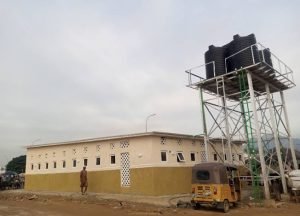
Coupled with this is poverty, which often leaves vulnerable populations with limited options for proper sanitation facilities. The thread of mismanagement weaves its way through this narrative, further complicating efforts to curtail this hazardous practice.
As the new minister takes the helm, he must confront this multifaceted challenge head-on, armed with a multidimensional approach that extends beyond conventional tactics. The battle against open defecation mandates varied measures that will address infrastructure deficits, enlighten communities, uplift the disadvantaged, and reconfigure systems for effective management.
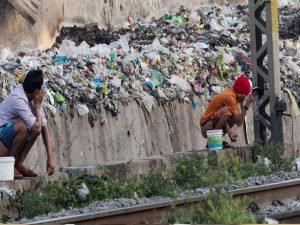
The minister’s mandate is a call to holistic action that will put these diverse factors into consideration so thaprogress.
Motor park touts “agbero”
Motorists and commuters traversing the FCT find themselves ensnared in a disquieting web spun by motor park touts, also largely referred to as “agberos”. This group of individuals are without defined vocations or portfolios.
They mostly target private vehicle owners who, in the wake of relentless hardships, dare to venture onto the streets during twilight hours. Driven by the need to make additional income, they fall prey to the agberos. But even commercial drivers are not exempted from their harassment.
During evenings, when passengers disembark within zones patrolled by the agberos, the drivers’ vehicles are marked as targets for extortion. They swarm, exploit any perceived infraction for financial gain; whether it be an accusation of improper parking or a lack of motor union registration.
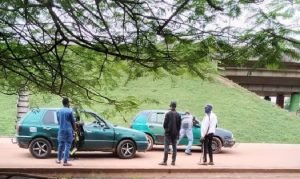
According to Temitople Awetu, the agberos are affiliated with a myriad of commercial motor unions. Among them are privately owned entities that have allegedly inked a formal alliance with the Abuja Municipal Area Council (AMAC). These unions, while specific in organisational structure, function like invisible dominions that divide and rule over the FCT’s transportation hotspots. “They are everywhere,” he said.
He continued by saying, “Different unions, different uniforms, they will just hijack your car and start asking you for money.”
From the bustling crossroads of Area 1 Junction to the convergence at Berger Junction, from the bustling arteries of Apo Bridge to the organised chaos of Jabi Motor Park, the agberos exert their grip in diverse locales. The labyrinthine lanes of Wuse Market and the bustling Banex Junction stand as further battlegrounds where these figures ply their trade.
Curiously, these territories, each presided over by a different union, underscore the intricate mesh of the agberos’ dominion.
If these 5 major issues are addressed by the Minister, the FCT will rebound to its widely acclaimed beauty and splendour, and once again, residents will be able to move freely without fear of attack or intimidation.



